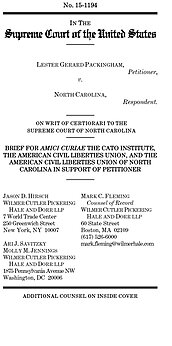Learn more about Cato’s Amicus Briefs Program.
Lester Packingham beat a parking ticket in court and celebrated on his Facebook page by proclaiming, “God is good! … Praise be to GOD, WOW! Thanks JESUS!” For this post, he was sentenced to prison — because he was a registered sex offender and a North Carolina statute bans such people from accessing a wide variety of websites. (Packingham took “indecent liberties with a minor” when he was 21, receiving a suspended sentence and probation, which he had completed.) The law is meant to prevent communications between sex offenders and minors, but it sweeps so broadly that it conflicts with basic First Amendment principles. It doesn’t even require the state to prove that the accused had contact with (or gathered information about) a minor, or intended to do so, or accessed a website for any other illicit purpose. After the state court of appeals overturned Packingham’s conviction — finding the criminal “access” provision unconstitutional — the North Carolina Supreme Court, over vigorous dissent, reversed and reinstated the conviction and sentence. The U.S. Supreme Court took the case and now Cato, joined by the ACLU, has filed an amicus brief supporting Packingham’s position. The North Carolina law bans access not just to what people consider to social-media sites, but also any sites that enable some form of connection between visitors, which would include YouTube, Wikipedia, and even the New York Times. The statute is also vague, in that it covers websites that “permit” minor children to create profiles or pages — and you can’t even find out what a website “permits” without first looking at its terms of service — itself a violation of the statute. Even if the site purports to stop minors from accessing its content, it’s impossible for someone to know whether and how that contractual provision is enforced in practice. Someone subject to this law literally can’t know what he can’t do or say; the police themselves aren’t sure! The statute also fails constitutional scrutiny because it criminalizes speech based on the identity of the speaker. It’s well established that a state may not burden “a narrow class of disfavored speaker,” but that’s exactly what happens here. The very purpose of the First Amendment is to protect the speech of disfavored minorities — which sex offenders certainly are. Signaling out this speech for prosecution — without any allegation that it relates to conduct or motive — should earn the Tar Heel State a big “dislike” from the Supreme Court.
